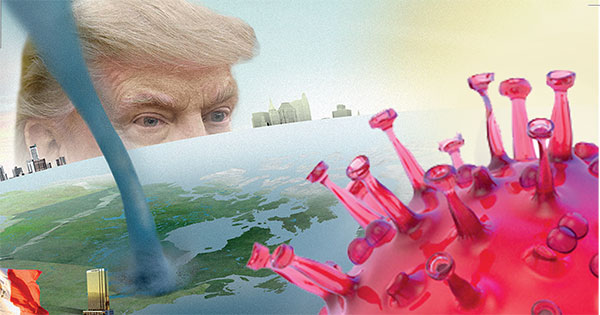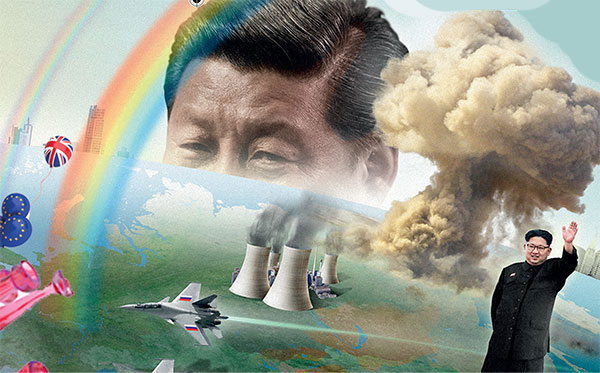How investors can still profit from emerging markets in a deglobalising world
How will the decline of globalisation reshape the global economy? Tom Bailey writes.
27th July 2020 14:27
by Tom Bailey from interactive investor
How will the decline of globalisation reshape the global economy? Tom Bailey writes.

For the past five years or so there has been a growing sense that globalisation – the rising flow of goods, people, production and capital across borders, alongside increased global economic and political cooperation – may be going into reverse. Declining global trade volumes, the Brexit referendum result in the UK and the election of Donald Trump in the US can be seen as representing the start of a backlash against globalisation.
Recently, such sentiment has only strengthened. On the Continent, support for populist anti-EU parties has increased in Italy, Poland, Hungary, Spain, the Netherlands and Germany. Meanwhile, Trump’s policy towards China has proved as confrontational as he promised it would be, resulting in a full-blown trade war and fears that the US and Chinese economies may be on the cusp of decoupling.
With the global coronavirus outbreak, the outlook for globalisation has dimmed further. The past few months, it is argued, have made apparent the risks of an interconnected world. Most notably, the sprawling supply chains and outsourced production of multinational companies responsible for efficient production and economic growth in much of the world are now seen as a source of weakness. As a result, the fear is that countries around the world will start to adopt a more isolationist approach and that deglobalisation will accelerate.
In practice, this could mean a ‘re-shoring’ of certain strategic businesses, reduced reliance on global supply chains and greater support of domestic industry from governments. A worst-case scenario could mean the ripping up of trade agreements and a sharp contraction in international markets.
Emerging markets have been among the biggest winners during the past three decades of globalisation. Principally, the increase in cross-border trade and the outsourcing of production to emerging markets have helped kick-start and support economic growth. This growth has been key to selling the emerging markets asset class to investors. It is reasonable, therefore, that investors should want to know how emerging markets might fare in a deglobalising world.
- Bruce Stout on the dividend ‘reset level’ and deglobalisation
All shapes and sizes
Ramesh Mantri, an adviser to the Ashoka India Equity investment trust, says: “While all emerging markets are seemingly caught in this storm called deglobalisation, they are not all necessarily in the same boat.”
His point is that some emerging markets have been less exposed to globalisation than others. He notes that India is “predominantly domestic consumption- driven and consequently has the least exposure to global trade among emerging markets”.
Mantri says emerging markets such as China, Russia, Brazil and South Africa have a much larger export basket and are consequently more vulnerable. He adds: “We believe India would be the least impacted by deglobalisation among emerging market nations.”
While it might be argued that Mantri is talking up his trust’s own book, other investment managers take a similar view. David Jane, manager of Miton’s multi-asset fund range, is mindful of the risk of deglobalisation and prefers more “self-reliant economies” for emerging market exposure. He says: “Rather than focusing on export-driven economies in Southeast Asia, we have held Indian equities, as the Indian economy is largely driven by domestic consumption, rather than exports to the developed world. This has meant that India has been largely unaffected by the current trade war and the significant reconfiguration of supply chains taking place in an era of deglobalisation.”
Distinctions between individual emerging markets are also emphasised by Michel Perera, chief investment officer at Canaccord Genuity Wealth Management. He notes that the most vulnerable countries would be China (for political reasons) and South Korea and Taiwan (because of their electronic parts industries). However, he believes India is also vulnerable because of its globalisation-dependent software industry.
His view is that commodity exporters would be the safest emerging market bets in a deglobalising world. “Commodity-exporting emerging markets will, logically, not be affected, since you can’t replace these products, so Indonesia, Brazil, Chile, South Africa and Russia should be reasonably protected,” he says.
Perera adds that frontier markets such as Bangladesh and Vietnam will also suffer less. “Their costs are so low and they are less in the political limelight.”

Counter argument
That said, Perera is sceptical about the deglobalisation thesis. He envisions a regionalisation of trade, with different trading blocs strengthening or forming, rather than a complete reversal of globalisation. “Trade advantages are so significant that no country will want to do without them,” he says.
On top of that, only a limited amount of production could be relocated back to developed economies in North America and Europe. When it comes to low-value manufactured goods such as textiles and shoes, wages there are too high.
More plausible, he says, is a return of more sophisticated production, with developed economies able to make use of automation to bring back manufacturing without suffering high labour costs. But even then, he is unconvinced by the deglobalisation argument. He points out that a ventilator, for example, “has 1,600 parts coming from dozens of different countries, and you just don’t replace all that”.
George Lagarias, chief economist at Mazars, meanwhile, argues that globalisation is an unstoppable force akin to the industrial revolution. He says: “Globalisation is a historic and natural trend. It can’t be stopped or reversed – much like the industrial revolution.”
Macro mistake
Either way, Justin Leverenz, senior portfolio manager for the OFI Emerging Markets Equity team at Invesco, believes macroeconomic headlines should not influence investor decisions much. He says: “We believe it is wrong to use macroeconomic growth as a basis for investing in emerging market equities in the pursuit of sustainable returns.” He argues that investors should focus on finding “attractive firms with durable growth, sustainable advantages and embedded real options that have been under-appreciated.” He adds that, even if deglobalisation does hit economic growth in emerging markets, there are plenty of idiosyncratic firms there with strong investment cases – many of which are “inordinately cheap”.
Andrew Ness, co-manager of Templeton Emerging Markets investment trust, takes a similar view. “We don’t spend much time on geopolitics,” he says. Instead, his trust “focuses on company-specific factors, using its network of global analysts to understand business models and how firms are prepared for the risks and opportunities that arise in a changing world”.
Investing in a deglobalising world
The sorts of funds and trusts that should weather a less economically globalised world well are likely be those with lighter weightings to the export side of emerging markets. In other words, funds with a tilt towards domestic consumption.
A good example of such a fund is the Fundsmith Emerging Equities Trust. The trust has a heavy overweighting to India and consumer-focused firms. Over the past decade this has caused it to underperform the benchmark index, and other emerging market funds and trusts. The risk here is that the deglobalisation thesis turns out to be mistaken, in which case the trust may continue to underperform its peers.
The alternative would be to opt for funds or trusts that try to tune out the macroeconomic noise and focus on companies believed to have strong fundamentals and growth prospects, regardless of the bigger picture. Templeton Emerging Market investment trust attempts to do just that. It is broadly agnostic about the countries it invests in. Lead manager Chetan Sehgal once told Money Observer he would invest in any emerging market with the exceptions, perhaps, of Venezuela and Zimbabwe.
This article was originally published in our sister magazine Money Observer, which ceased publication in August 2020.
These articles are provided for information purposes only. Occasionally, an opinion about whether to buy or sell a specific investment may be provided by third parties. The content is not intended to be a personal recommendation to buy or sell any financial instrument or product, or to adopt any investment strategy as it is not provided based on an assessment of your investing knowledge and experience, your financial situation or your investment objectives. The value of your investments, and the income derived from them, may go down as well as up. You may not get back all the money that you invest. The investments referred to in this article may not be suitable for all investors, and if in doubt, an investor should seek advice from a qualified investment adviser.
Full performance can be found on the company or index summary page on the interactive investor website. Simply click on the company's or index name highlighted in the article.